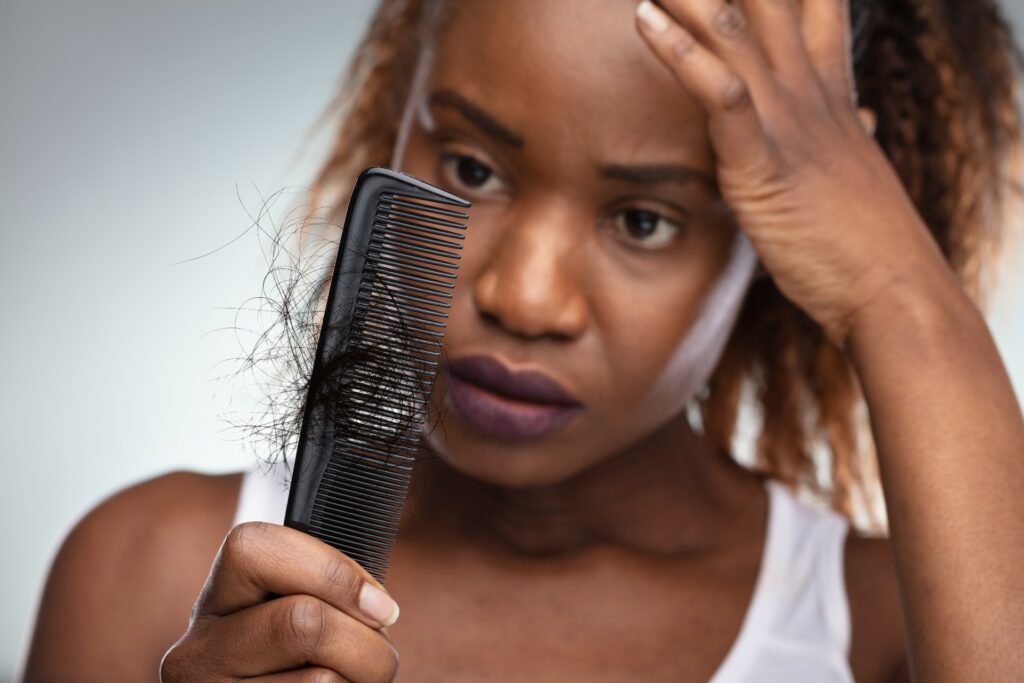Do Weaves and Extensions Cause Irreversible Damage to Hair?

After watching the Olympics, it’s indisputable that weaves and extensions are a great way to switch up a person’s look. Before making an appointment to get these applied, it is worth understanding how they affect natural hair and how to protect natural hair while adorning these beautiful locks.
Weaves and extensions can damage natural hair and cause hair loss. The good news is that proper precautions and hair care steps can help prevent hair damage when using extensions or weaves.
Those individuals who choose weaves and extensions to enhance their existing hairstyle or change it up completely can take steps to minimize hair damage. This process and maintenance are an investment in money and time. Today’s extension products have countless possibilities, including different lengths, volumes, styles, and colors. It’s tempting to avoid trying out these appealing and fun looks. Still, not every salon that offers the application service will provide sufficient warnings or care instructions to protect natural hair and minimize hair loss.
Ways to Prevent Hair Damage
Weaves and extensions require the natural hair to be pulled back tightly, which can strain and break natural hair. Strands of hair can fall out or break. In the worst case, hair follicles can become damaged, leading to permanent hair loss. So, before you head off to the salon, here are some things to know:
- Prepare by getting natural hair in the best shape possible ahead of time. Before getting a weave or extensions, be sure natural hair is free of product buildup. Hair products, including conditioner, help hair stay moist and healthy. In between weave and extension applications, use strengthening shampoo and conditioner to keep natural hair hydrated and strong to minimize damage.
- Go to a professional stylist to get weaves and extensions done. It is easier in a salon to watch your stylist work and alert them of any concerns. If you experience pain or a headache at any time during the application, it is too tight. If a weave or extensions are too tight, they are pulling on the hair, and this damage can be permanent. Professional stylists should be open to loosening the affected area, but they won’t likely know unless you tell them, so speak up!
- Keep your hair clean while wearing extensions. Clip-in extensions should be removed while natural hair is washed. Always use a gentle moisturizing shampoo followed by a moisturizing and strengthening conditioner to keep the scalp clean and hydrated. Although the temptation may be to skip everyday hair care routines while extensions are in, taking the extra time in the long run will be worth it.
- Baby, those baby hairs. If you have seen anyone with extensions or a weave, you have seen wispy little hairs around the hairline. These “baby hairs” are very fragile and delicate. Only water-based gels and moisturizers can be used on these hairs to keep them healthy. Never use heat-style tools on these tiny hairs.
- Change up the hairstyle when wearing weaves or extensions. Any hairstyle worn for two or three months is going to begin noticeable breakage in natural hair. Even those without extensions who wear a ponytail every day will experience breakage. Switching up a hairstyle while wearing extensions and weaves is highly recommended and is advice that should be given at the salon where you get them applied.
When considering extensions and weaves, it is worth investing in products that will strengthen and hydrate hair before, during, and after to keep natural hair healthy and avoid permanent hair loss. If you experience hair loss or have a concern while wearing extensions or weaves, visit a board-certified dermatologist. Someone licensed and experienced in dermatology can address any hair loss concerns. As is true with most things, the sooner you address issues, the more likely the damage is reversible.
Three Tips About Hair Loss from Dermatologists
Because dermatology includes skin, hair, and nails, a professional dermatologist is the best person to seek professional advice from when experiencing hair loss. When visiting a dermatologist’s office, they will ask questions to help pinpoint the cause of hair loss. Here are some things you can prepare to share in your consultation:
- Was hair loss over time, or did it come on quickly?
- Are there noticeable issues with the scalp, nails, or other body parts covered in hair?
- Is hair brittle or weak and prone to breakage?
Often, hair loss can be attributed to vitamin deficiencies, hormones, infections, or medications. In some cases of hair loss, hair should naturally grow back, including giving birth, surgery, cancer treatment, and rapid weight loss. Only a professional dermatologist can properly diagnose hair loss and provide treatment options. If you live in Atlanta, Buckhead Dermatology offers affordable hair loss treatments and accepts new patients. Dr. Sherrie Straughn has decades of experience helping patients address their concerns about hair and scalp issues, including hair loss.
